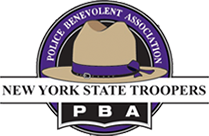Newspaper article detailing changes in Troopers’ responsibilities post-9/11
PBA, 2003-05-02
A reporter from The Buffalo News wrote an article for the May 2, 2003 newspaper detailing the ever-evolving changes in Troopers’ responsibilities post-9/11. PBA President Dan De Federicis was interviewed for the article. Below is a link to the story as well as the text:
http://www.buffalonews.com/editorial/20030502/1041404.asp
STATE POLICE
Post-9/11 complexities demand more of troopers
By DAN HERBECK
News Staff Reporter
5/2/2003

ROBERT KIRKHAM/Buffalo News
State Trooper James C. Jackson III guides his bomb-sniffing dog, Dobbs, in a search at the Lewiston-Queenston Bridge.
It was one of those disturbing little false alarms that seem to go off almost every day in Buffalo Niagara in the edgy world of post-9/11.
State Trooper James C. Jackson III recently got an urgent call to take his bomb-detection dog, Dobbs, to the Peace Bridge, where a rental truck had been abandoned in a U.S. Customs Service parking lot.
A computer check indicated that the truck had been stolen. As Jackson and his German shepherd approached the vehicle, the trooper noticed two wires hanging out the rear of the storage compartment.
"Your nerves go immediately on edge when you see something like that," Jackson recalled. "Dobbs sniffed all around the truck. No explosives. The wires sticking out were from a stereo system.
"It was just an abandoned truck, nothing more. Thank God, most of these things we check are negative."
For Jackson and about 220 other troopers assigned to duty in this region, police work changed – probably forever – on the morning of Sept. 11, 2001.
Their primary role in homeland security is protecting infrastructure – the Niagara Power Project, the Somerset power plant, the international bridges in Buffalo and Niagara County and dozens of other locations that make Western New York a target for potential terrorism.
Authorities say that no "specific threats" of terrorist attacks have been made in this region but that troopers are working closely with federal agents and others to prevent one.
"Our people are proud to be doing their part for homeland security," said State Police Maj. Michael McManus, commander of Troop A, headquartered in Batavia. "The tricky part is getting enough bodies every day to do all the work."
The responsibilities of counterterrorism are putting a strain on the State Police, an agency that has been used largely for traffic enforcement and criminal investigation through much of its 86-year history.
Troopers are now regularly assigned to assist federal inspectors at the bridges and security personnel at power and chemical plants, water treatment facilities and other possible trouble spots.
The new security responsibilities come with a hefty price tag. The Pataki administration has estimated that the state is paying $3 million each week for the additional counterterrorism duties taken on by State Police, National Guard and Correctional Services Department.
The State Police force is now at its highest staffing level ever – 4,500. Two hundred troopers were added in March for the specific purpose of homeland security.
Virtually every trooper in Western New York spends at least part of his or her time on counterterrorism efforts.
"It’s a constant juggling act, but the people we’ve been working with – like the U.S. Customs Service – have been great," said Capt. Ralph E. Pratt. "I think we all realize we have to put any differences or turf battles aside and do all we can to stop another 9/11 from happening."
On a recent morning at the Lewiston-Queenston Bridge, Jackson and his dog were helping Troopers Bill Keane and Robert Vishion from the Troop A Truck Squad examine trucks coming over from Canada.
"Our focus used to be checking trucks for vehicle and driver safety. That’s been expanded to counterterrorism," Keane said.
"The truck bomb has been the terrorist’s weapon of choice. (Timothy J.) McVeigh used a truck bomb at Oklahoma City. The first World Trade Center bombing was done with a truck bomb, and the two U.S. embassies in Africa were attacked with truck bombs."
Jackson said his dog is used to examine at least 20 cars, trucks and buildings for signs of explosives every day.
Law enforcement officials said the state has spent millions to upgrade security at the Niagara Power Project, including improvements in video surveillance, more security fences and the placement of long rows of boulders at strategic locations to block access and deter a truck bomb.
"It’s not something we can say much about, but we have troopers out there every day, and we work closely with the power project’s own security people," McManus said.
Some troopers worry that their ranks are being stretched thin by the new duties.
"Troopers are proud of their role in all this, but we have to remember, our regular duties still have to be done," said Daniel M. De Federicis, president of the State Troopers Police Benevolent Association.
"We have to ensure we stop police agencies from creating so many special details that the road patrol levels suffer.
"Remember, it was a state trooper on road patrol (in Oklahoma) who arrested Timothy McVeigh. He noticed McVeigh had no license plate on his car. It was a routine traffic stop, but he caught a terrorist."
